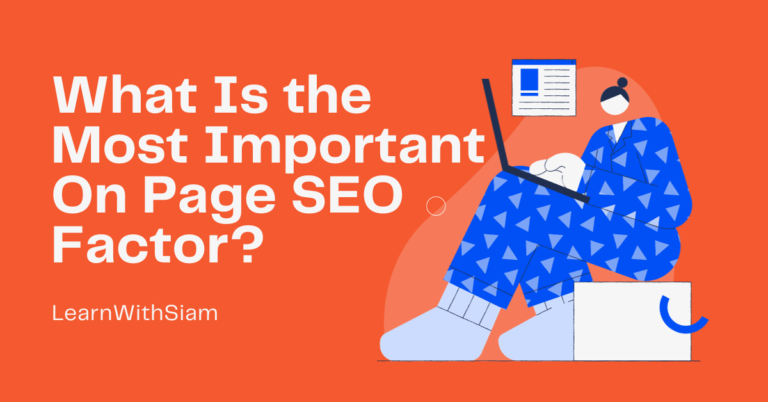Which Choice Is On Page SEO Practice 2023?
In the ever-evolving landscape of digital marketing, mastering search engine optimization (SEO) is paramount for online success. Among the myriad of SEO practices, On Page SEO stands out as a foundational pillar. But what exactly does it entail, and how can you make the right choices to excel in on page SEO?
In this comprehensive guide, we will delve deep into the world of on page SEO, answering the critical question: Which choice is on page SEO practice? We’ll explore various aspects of on page SEO and provide you with actionable insights to boost your website’s visibility on search engine results pages (SERPs).
What is On Page SEO?

Before we dive into the specifics, let’s define on page SEO. At its core, on page SEO refers to the optimization techniques applied directly to your website’s individual pages to enhance their visibility and ranking on search engines like Google, Bing, and Yahoo. It focuses on factors you can control on your webpages, unlike off page SEO, which pertains to external factors like backlinks.
The Significance of On Page SEO
Understanding the significance of on page SEO is crucial. It serves as the foundation for your website’s overall SEO strategy. Effective on page SEO not only helps search engines understand your content better but also provides a seamless user experience, which can result in higher rankings and increased organic traffic.
Which Choice is On Page SEO Practice?
Now, let’s address the heart of the matter: which choices constitute on page SEO practice? To answer this, we’ll break down the essential components and strategies involved.
Keyword Research
Keyword research is the bedrock of on page SEO. It involves identifying the words and phrases your target audience is using to search for information related to your niche. By selecting relevant keywords, you can optimize your content around them, making it more likely to rank higher in search results.
Content Quality
High-quality content is king in the world of SEO. Your content should be informative, engaging, and tailored to meet the needs of your audience. The aim is to provide value that keeps visitors on your page longer, signaling to search engines that your content is relevant and valuable.
Title Tags
Title tags are the headlines that appear on search engine results pages. They should be concise, descriptive, and contain the primary keyword for the page. Crafting compelling title tags can entice users to click on your link.
Meta Descriptions
While not a direct ranking factor, meta descriptions play a crucial role in enticing users to click through to your website. They should provide a concise summary of the page’s content while including relevant keywords.
Header Tags
Using header tags (H1, H2, H3, etc.) structures your content and makes it more readable. Search engines use these tags to understand the hierarchy of information on your page. Including keywords in headers can improve your SEO.
Keyword Placement
Strategically placing keywords throughout your content is vital. However, avoid keyword stuffing, as it can lead to penalties from search engines. Aim for a natural and logical keyword placement that enhances readability.
Internal Linking
Internal linking connects different pages on your website. It helps distribute page authority, encourages visitors to explore more of your content, and enhances user experience.
Image Optimization
Images are an integral part of web content. Ensure that your images are appropriately named and compressed for faster loading times. Use descriptive alt text to make them accessible to search engines.
Mobile Optimization
Given the increasing use of mobile devices, mobile optimization is essential. Ensure that your website is responsive and provides an excellent user experience on smartphones and tablets.
User Experience
User experience encompasses various factors, from page speed to navigation. A well-designed and user-friendly website not only pleases visitors but also ranks better on search engines.
Conclusion
In the realm of digital marketing, mastering on page SEO is the key to achieving higher search engine rankings and driving organic traffic to your website. By making informed choices in areas such as keyword research, content quality, and user experience, you can enhance your website’s visibility and deliver a better online experience to your audience. Remember, the answer to “Which choice is on page SEO practice?” lies in a well-rounded approach that considers all these crucial elements.
FAQs
What is the role of keyword research in on page SEO?
Keyword research is the foundation of on page SEO. It helps you understand what your audience is searching for and guides your content creation process. By optimizing your content around relevant keywords, you increase the chances of ranking higher in search results.
How can I optimize my website’s mobile experience?
Mobile optimization is crucial in today’s digital landscape. Ensure your website is responsive and loads quickly on mobile devices. Prioritize mobile-friendly design, as this can positively impact your SEO rankings.
Why is internal linking important for on page SEO?
Internal linking is essential for several reasons. It helps distribute page authority throughout your website, encourages users to explore more of your content, and improves overall user experience. Search engines also use internal links to discover and index your pages.
Are meta descriptions still relevant for SEO?
Yes, meta descriptions are still relevant for SEO. While they don’t directly influence rankings, they play a crucial role in attracting clicks from search engine results pages. A well-crafted meta description can improve click-through rates.
What is the ideal content length for on page SEO?
There’s no one-size-fits-all answer to content length, as it depends on your niche and audience. However, aim for comprehensive and informative content that thoroughly covers the topic. In many cases, longer content (1,500+ words) tends to perform well in search rankings.



